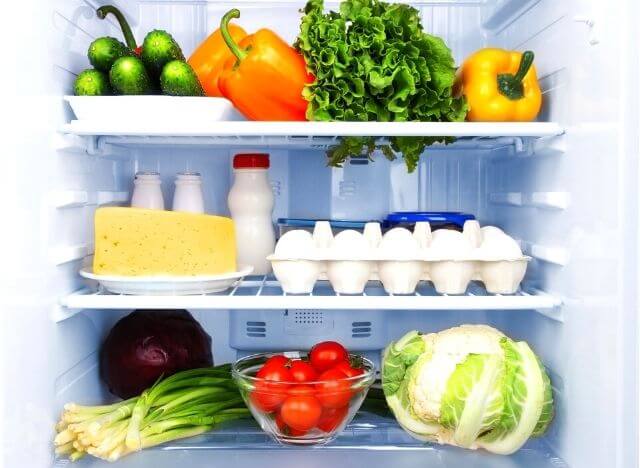Refrigerator is a perfect choice for storing food safe and fresh, but it is not a magic cabinet to put all kinds of food without any attention. To keep the fridge clean, without bad smell and food perfectly fresh, you should know how to store food in the fridge correctly.
Why does food last longer in the refrigerator?
Inhibit the growth of bacteria by low temperature
With low temperature, refrigerator can inhibit enzyme activity and microbial activity. Most of the biochemical reactions and metabolic activity of microorganisms are affected by the temperature factor.
The temperature of the refrigerator reduces the intensity of chemical, biochemical and biological changes to prolong the shelf life of fresh or processed foods. During the cooling process, biological changes such as cell metabolism and microbial growth will gradually decrease.
With the low temperature of the freezer, in addition to the inhibitory effect, the refrigerator also loses the active environment of most enzymes and microorganisms. Therefore, food stored in the freezer can keep longer than stored in the refrigerator.
Limit moisture, inhibit moisture-loving bacteria
Air humidity is an important factor for microorganisms to survive and grow, so foods containing a lot of water will be susceptible to bacteria. The refrigerator is designed so that the inside is always cold and dry, eliminating the humid environment to help inhibit and reduce damage caused by moisture-loving microorganisms.However, you should note that the refrigerator only supports prolonging the preservation of food, it cannot kill bacteria.
Further reading: Which Refrigerator is the Best for a Family with 4-5 Members?
How to limit bacteria in the refrigerator
Wash food before putting it in the fridge. To reduce the harmful microorganisms on the surface of food, you should wash and soak in salt water before putting food in the refrigerator.
Properly preserve cooked food. Cooked foods that want to be preserved must be placed in the refrigerator for at least 4 hours after cooking. When removed from the refrigerator, you must use it immediately, no longer than 4 hours at home temperature.
Freeze some vegetables. Some vegetables such as cabbage, spinach, celery, carrots, peaches, grapes, apples… are suitable for storage at 0 degrees Celsius. However, you should not put them in the refrigerator right after buying them, because the low temperature will inhibit the fermentation activity, the residual toxins make them unable to decompose. Therefore, it is best to leave it at room temperature for a day, then put it in the refrigerator.
You may also like: How to Prevent Mold in Refrigerator
Food should not be refrigerated
Fruits that contain a lot of water such as tomatoes, cantaloupe, red peppers, lychees, etc. You should not store them for a long time in the fridge. Due to the relatively high-water content, these fruits, when refrigerated for a long time, will cause discoloration, appear black, brown dots, soften and changes in taste.
Foods containing processed starch, such as bread, sandwiches, etc., should not be stored in the refrigerator because the cooling process will make the food hard and dry, causing loss of taste.
In addition, for chocolate, smoked meat, … you should also not store in the refrigerator if you want to keep their original taste and nutrients.
Food should be kept in the fridge
The main purpose of the fridge is to keep all of your food fresh for longer use. Many types of food that you need to store in the fridge instead of putting them outsides as below:
- Cheese: Cheese is known as a high-protein contain food so it creates a convenient environment for bacteria to develop. Then, all of your cheeses might turn bad quickly if you let them outside for too long.
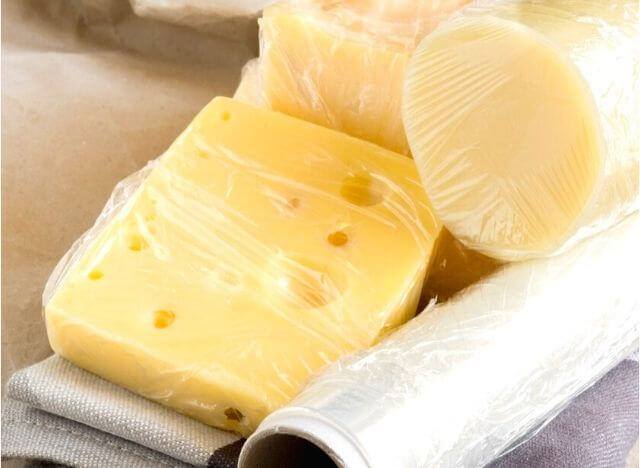
Further reading: How to Store Cheese in Freezer Properly?
- Mayonnaise, ketchup, and salad dressing: Most of these are made mainly from eggs and cream, then they are more likely to spoil out. The products can maintain their original taste when being chilled.
- Apples: Apples should be stored in the fridge to keep the moisture level as long as possible.
- Eggs: The hot temperature in your kitchen might ruin your eggs after such a short period. So you should put your eggs into the fridge once you buy them from the local supermarket.
- Avocados: Unlike apples, you ought to wait until your avocados ripe before fridge storage. The dark and cool environment inside the fridge will help to prevent any avocado from over ripening.
- Meat, fish, and poultry: You can keep it cool if you would like to use them soon, or freeze them for later use. These methods will keep them fresh until you are ready to cook.
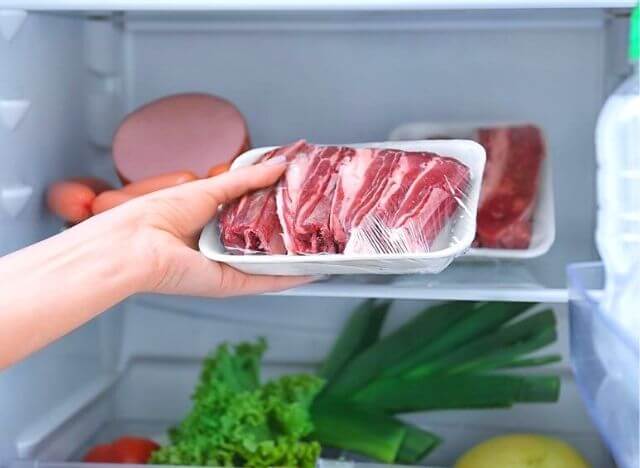
- Canned foods and grains: Most whole grain flours can last longer in the fridge up to 6 months rather than in the dry pantry. And for any canned foods which are already opened, you need to cool them inside the fridge for the following use.
How to store food in the fridge correctly?
If you know how to store your food properly, it will not only preserve the food safely but also help the fridge function well. Here’s how:
- Have your items wrapped carefully, then place them into several covered containers
- Store food as quick as possible to avoid keeping them in the room temperature for too long
- Do not put too many foods inside the fridge. You should leave the fridge enough space for air circulation
- Adjust the right temperature. Set up the internal temperature at 5 degrees Celsius or under, especially for the freezer, the ideal temperature should be below sub 15 degrees Celsius
- Leave your cooked foods to cool down before storing them in the fridge. You should keep these foods away from any raw item to avoid bacteria spreading
- Check your food routinely so that you can discharge any spoiled or moldy food immediately
- Use safe containers. Make sure all of your foods are kept in durable and non-toxic containers. Instead of plastic bags, sometimes you should choose other environmentally friendly bags or use glass containers if suitable.
You may also like: How to Use a Mini Fridge Safely and Efficiently?
Notes when store food in freezer
- Set your freezer compartment to the temperature level of -18ºC.
- Refrigerate food before putting it in the freezer. Putting hot food in the freezer increases the temperature in the freezer, causing evaporation and loss of moisture in nearby foods. Therefore, before putting foods in the freezer, chill them in the refrigerator for one to two hours first to reduce the temperature.
- Limit opening and closing cabinets. Every time you open the freezer door, cold air escapes and is replaced by warm air from the room. Not only does this waste energy as the freezer has to work harder to equalize the temperature again, but it also leads to evaporation and loss of moisture in the food.
- Save enough space for the freezer. Ideally, you should keep your freezer always taking up about 75% of the cabinet space. This helps keep other foods cold.
- Use sealed food bags and containers. The freezer food containers are usually thicker, more durable, and more airtight.
- Push the excess air out of the freezer bag. It’s important when storing food in the freezer to push or suck all the air out of the bag before refrigerating the food. Use a vacuum bag to effectively push the air out.
Further reading: What Are the Best Cheap Freezers for Home?
How long can food last in the fridge or freezer?
Raw meats: You should put them in the freezer and cover tightly before putting them in. Meats such as pork, beef, chicken, … if frozen, the time can be up to 4 months or 1 year. However, if it has been cooked, you should only leave it for 1-2 days, not too long.
Seafood: Similarly, you should also wrap seafood carefully, to avoid spoilage and odor spread. In the freezer, shellfish can usually be preserved for 2-3 months, fresh fish is at most 5 months.
For more details, please visit this link about Cold Food Storage Chart.
Fruits and vegetables: If they are berries, they can be stored for about 3 months, while other flowers and fruits usually do not last long, so you should put them in an airtight bag or box.
Top tips to keep food fresh longer
It has some ways for you to make your food fresh longer as follows:
Prepare the food before refrigerating
- Wash vegetables and fruits with clean water, then dry them out completely before refrigerating. It is effective for you to keep your veggies or fruits inside the crisper bins to keep them separated from other foods
- Cook, peel or cut some of your veggies in advance so that it is easy for them to stay fresh longer
Use suitable containers
- Once you put your food into the containers, you should ensure that there is no air left inside the packaging
- Transfer your eggs from the door shelf or tray into a carton container
- Keep the mushroom inside the paper bags instead of the plastic bags
Check the fridge regularly
Check the temperature of the fridge daily in order to make any immediate adjustment.
Arrange your fridge properly
- Preserve the raw and cooked food separately because bacteria from raw food may spread in the fridge and spoil the cooked food
- Use the provided shelves in order to separate other different types of food
- Do not put the veggies close to fruit so that they will not ripe too fast before you are ready to eat
How to arrange food in the fridge properly
On the freezer compartment
The freezer compartment is a place where the temperature is very low. Therefore, in this compartment you should store fresh foods you want to keep for a long time such as meat, fish, seafood… Plus, you can also use the freezer to make ice cream, yogurt, or ice cubes for instant refreshment.
In the refrigerator compartment
The refrigerator compartment includes the door, upper shelf, lower shelf and drawer. With each such part, we should have a reasonable arrangement.
Fridge door
This place has less cold air. Therefore, in this position you should keep dry foods or spices and sauces that can be preserved for a long time. With heavy products like water bottles, you should keep them on the bottom shelf of the cabinet door.
Top shelf
For foods that do not need to be processed or cooked such as leftovers, ready-to-eat foods or drinks, you should put them in this compartment. Because this is a place with the right temperature to keep them fresh longer.
Lower shelves
The lower the shelves, the colder the shelves get, so it’s the right place to store milk, eggs, meats or seafood that want to use quickly or defrost here. Always note that when storing these foods, you should put them in a sealed container or cover to avoid leaking other foods and causing odors to the refrigerator.
Drawer
Most of the drawers are designed to help maintain the right humidity for vegetables, tubers and fruits. Because vegetables are very perishable, wilt when dehydrated and spoil when there is high humidity, they should be kept in a closed cabinet for better preservation.
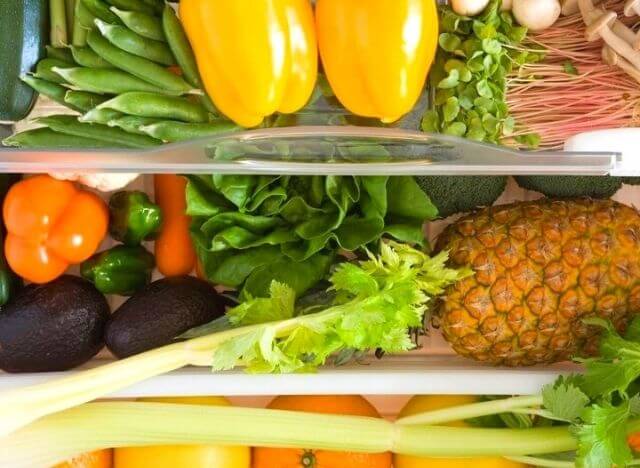
How to properly store cooked food?
Cooked food is only safe within 2-4 hours of cooking and at a temperature of 4-60 degrees Celsius it is very easy to spoil. Although the food has been cooked, but if you do not store it properly, bacteria still multiply, grow and affect our health.
Even with foods that have been sterilized and sealed, if you open the box, bacteria and mold can easily enter and grow in the air.
Not everyone knows how to safely store food in the refrigerator. Apply the following storage methods to ensure the food safety and protect your health.
Classify your food
It’s not as simple as just putting all the food in the fridge. You need to arrange them scientifically by classifying food. You must separate cooked food, raw food, vegetables, fruits. Raw meats and greens should be on the bottom shelf of the refrigerator. The top tray of the cooler is more suitable for storing cooked food.
With foods that have a specific or strong smell like jackfruit or durian, you should put them in a separate box and keep them away from cooked foods to avoid the smell.
Cover the food, pack it carefully
For cooked foods that you want to preserve for a long time, it is best to wrap them with plastic wrap, zip bags, food bags, special vacuum bags or food containers. Storing food with wraps, vacuum bags or boxes is both neat, clean and helps limit bacteria from entering your food. The smell of food does not spread throughout the refrigerator, causing unpleasant odors.
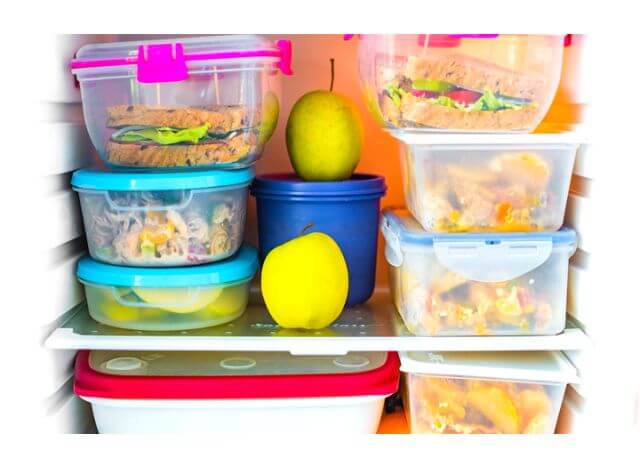
Further reading: What are the Best Food Storage Containers for Fridge?
Food should be cooked immediately after defrosting
Normally, you often buy fresh meat and fish to store in the refrigerator and then defrost to cook when needed. It is best to cook immediately after defrosting to keep the meat fresh, do not defrost for too long or defrost and re-freeze the food.
Usually, people store beef, chicken, fish, and pork in the freezer. The best way to preserve raw food is to divide this food into small portion, enough for each meal. When cooking, you only need to defrost a portion, no need to eat it all.
Let the cooked food cool down before putting it in the fridge
Many people have the habit of putting food in the refrigerator regardless of whether the food is hot or cold. You should only put cooked foods in the fridge when they have completely cooled down. Hot food in the refrigerator, it will be easily degraded, spoil quickly, and the taste will also change. Moreover, the food will evaporate and then condense, making it easy for bacteria to multiply.
Note the time that food stay safe in the fridge
How long it takes for cooked food to stay in the refrigerator will depend on the type of food. You should regularly check the refrigerator as well as check the foods stored in it.
Normally, vegetables will be very perishable, so green vegetables should only be stored for a few hours and then taken out to eat. It should not be left more than 12 hours or overnight because green vegetables will degrade, no longer good for your health.
With foods stored in the freezer, you should not leave them for too long. Freshness, deliciousness, and quality of food also decrease.
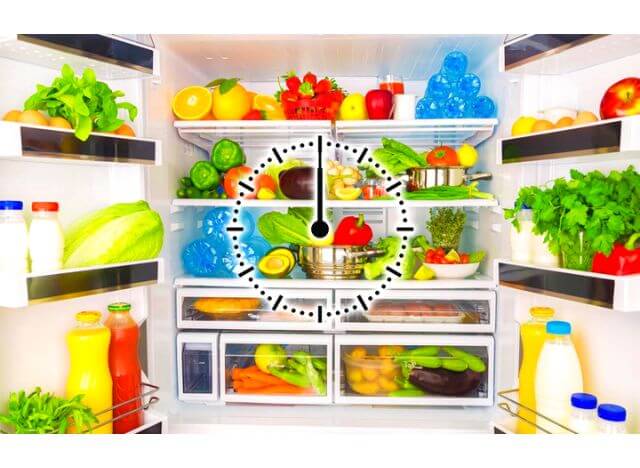
Adjust the temperature appropriately
The temperature in the refrigerator that is too high or too low is not good for the food because bacteria can survive at temperatures of about 4 degrees Celsius or more.
Refrigerators only inhibit the growth of bacteria, not kill them. Therefore, you need to adjust the temperature accordingly to inhibit bacteria. To preserve cooked food, it is best to set the refrigerator temperature between 1.7 and 3.3 degrees Celsius ( between 35° and 38°F) in the cooler and -18 degrees Celsius (or 0 degree F) in the freezer.
FAQs
Is it safe to store all food in the fridge?
In fact, it is not a good idea to keep all types of food inside the fridge. If you use the fridge to preserve the food, you need to eat them within the acceptable time. Cooling in the fridge might somehow change the texture and flavor of your food but the nutritional value will still be the same. So it is safe enough for your health.
How can you know if your food is still good in the fridge?
It is necessary for you to check your foods carefully to protect them from any damage inside the fridge. To do so, you can apply some following methods:
- Check the color of your items: For veggies, it is easy to determine whether they are edible by looking at the color. It will turn into a darker color if it is over-ripe or spoiled.
- Check the smell inside the containers: Many types of food will release the very unpleasant smell when they turn bad.
- Other signs such as blue or black spots, changes in the texture, etc
How often should you check your food in the fridge?
Normally, you should check your refrigerated food two times throughout the day. This number will vary for different types of food you have in the fridge.
Conclusion
It is convenient and safe for you to preserve your foods in the fridge. Many types of food are suitable to be stored inside the refrigerator. To keep it fresh longer, you need to take care of your foods during preparation and storage. With the proper protection, you can make them edible for later use.
References
1. Food safety and storage, betterhealth.vic.gov.au, Retrieved on Aug. 11, 2021
2. Refrigerate – The Basics, eatright.org, Jun. 23, 2018

